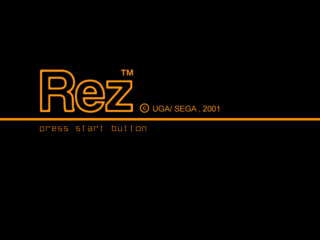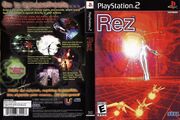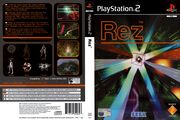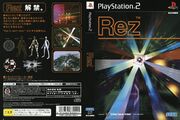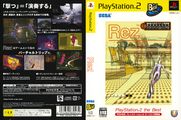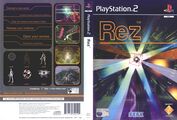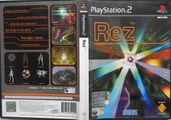Difference between revisions of "Rez"
From Sega Retro
m (Text replacement - "==Production credits==" to "==Production credits== Category:Use Creditstable template") |
|||
| (27 intermediate revisions by 5 users not shown) | |||
| Line 4: | Line 4: | ||
| developer=[[United Game Artists]], {{360}} [[Q Entertainment]] | | developer=[[United Game Artists]], {{360}} [[Q Entertainment]] | ||
| system=[[Sega Dreamcast]], [[PlayStation 2]], [[Xbox Live Arcade]] | | system=[[Sega Dreamcast]], [[PlayStation 2]], [[Xbox Live Arcade]] | ||
| − | |||
| sounddriver= | | sounddriver= | ||
| − | | peripherals={{DC}} [[Dreamcast VGA Box]], [[Dreamcast Jump Pack]], {{PS2}}Trans Vibrator | + | | peripherals={{DC}} [[Dreamcast VGA Box]], [[Dreamcast Jump Pack]], {{PS2}} [[Trans Vibrator]] |
| players=1 | | players=1 | ||
| genre=Shoot-'em-Up | | genre=Shoot-'em-Up | ||
| Line 21: | Line 20: | ||
| ps2_date_eu=2002-02-22 | | ps2_date_eu=2002-02-22 | ||
| ps2_code_eu=SCES-50501 | | ps2_code_eu=SCES-50501 | ||
| − | | ps2_date_jp=2001-11-22 | + | | ps2_date_jp=2001-11-22{{ref|https://web.archive.org/web/20070514111626/http://www.jp.playstation.com/software/title/slpm62101.html}} |
| ps2_code_jp=SLPM-62101 | | ps2_code_jp=SLPM-62101 | ||
| − | | ps2_rrp_jp=6,800 | + | | ps2_rrp_jp=6,800 (''7,140''){{ref|https://web.archive.org/web/20070514111626/http://www.jp.playstation.com/software/title/slpm62101.html}} |
| − | | ps2_date_jp_1=2001-11-22 | + | | ps2_date_jp_1=2001-11-22{{ref|https://web.archive.org/web/20011213225735/http://sega.jp/ps2/rez/}} |
| ps2_code_jp_1=SLPM-62100 | | ps2_code_jp_1=SLPM-62100 | ||
| − | | ps2_rrp_jp_1=8,800 | + | | ps2_rrp_jp_1=8,800{{ref|https://web.archive.org/web/20011213225735/http://sega.jp/ps2/rez/}} |
| ps2_type_jp_1=Special Package | | ps2_type_jp_1=Special Package | ||
| − | | ps2_date_jp_tb=2003-07-10 | + | | ps2_date_jp_tb=2003-07-10{{ref|https://web.archive.org/web/20060702024351/http://www.jp.playstation.com/software/title/slpm74006.html}} |
| ps2_code_jp_tb=SLPM-74006 | | ps2_code_jp_tb=SLPM-74006 | ||
| − | | ps2_rrp_jp_tb=3,000 (''3,150'') | + | | ps2_rrp_jp_tb=3,000 (''3,150''){{ref|https://web.archive.org/web/20060702024351/http://www.jp.playstation.com/software/title/slpm74006.html}} |
| + | | ps2_rrp_de=119,-{{fileref|Play DE 2001-12.pdf|page=53}} | ||
| + | | ps2_date_it=2002 | ||
}} | }} | ||
{{releases360 | {{releases360 | ||
| Line 52: | Line 53: | ||
| grb=a | | grb=a | ||
}} | }} | ||
| − | ''''' | + | '''''{{PAGENAME}}''''' (レズ) is a rail shoot-'em-up video game developed by [[United Game Artists]] and initially released by [[Sega]] simultaneously for the [[Sega Dreamcast]] and [[PlayStation 2]] in 2001. It was conceptualized and produced by [[Tetsuya Mizuguchi]] and built by many former members of the disbanded [[Team Andromeda]], the Sega development team behind the ''[[Panzer Dragoon]]'' series. Mizuguchi's company, Q Entertainment, released a high definition version (''Rez HD'') to the [[Xbox Live Arcade]] service in 2008. |
The game is notable for replacing the typical sound effects found in most rail shooter games with electronic music, with sounds and melodies created by the player as they target and destroy foes in the game, leading to a form of synesthesia, enhanced by an optional Trance Vibrator peripheral made by [[ASCII]]. Although ''Rez'' was critically acclaimed, it did not get much commercial attention, particularly in the United States where a Dreamcast port failed to surface. Working titles for the game were '''''K-Project''''', '''''Project Eden''''', and '''''Vibes''''', and before it was given a proper name, '''''The Sound Project'''''{{fileref|NextGeneration US 81.pdf|page=37}}. | The game is notable for replacing the typical sound effects found in most rail shooter games with electronic music, with sounds and melodies created by the player as they target and destroy foes in the game, leading to a form of synesthesia, enhanced by an optional Trance Vibrator peripheral made by [[ASCII]]. Although ''Rez'' was critically acclaimed, it did not get much commercial attention, particularly in the United States where a Dreamcast port failed to surface. Working titles for the game were '''''K-Project''''', '''''Project Eden''''', and '''''Vibes''''', and before it was given a proper name, '''''The Sound Project'''''{{fileref|NextGeneration US 81.pdf|page=37}}. | ||
==Story== | ==Story== | ||
| − | The game is set in futuristic computer " | + | The game is set in futuristic computer "super network" called the K-project where much of the data flow is controlled by an AI named Eden. Eden has become overwhelmed with the amount of knowledge gathered on the network after a virus infects her, causing her to doubt her existence and enter a shutdown sequence, which would create catastrophic problems everywhere should she be able to complete this. The player plays the protagonist virus, Swayzak (the same that infected Eden earlier), invading Eden's mainframe and battling the mainframe's defense systems to reveal the true being at Eden's core. |
| − | + | The K-Project name and much of the game's visual and synesthesia inspiration comes from the Russian painter Wassily Kandinsky, whose name is mentioned at the very end of the game credits, whereas the ''Rez'' name was inspired by the Underworld track of the same name. | |
==Gameplay== | ==Gameplay== | ||
| − | ''Rez'' is a rail shooter in which the player takes control of an onscreen avatar traveling along a predetermined path through the computer network. The player cannot affect his or her movement in any way. The player targets foes by holding a "lock-on" button while moving an aiming reticule over up to 8 enemies. Once the "lock-on" button is released, | + | ''Rez'' is a rail shooter in which the player takes control of an onscreen avatar traveling along a predetermined path through the computer network. The player cannot affect his or her movement in any way. The player targets foes by holding a "lock-on" button while moving an aiming reticule over up to 8 enemies. Once the "lock-on" button is released, Swayzak fires shots that home in on each target. Failure to hit an enemy or projectile in time may cause a collision, which reduces Swayzak's current evolution level by one and changes his avatar's form. The game is over if Swayzak is hit while at his lowest possible level. At higher evolution levels, the avatar appears as a humanoid figure, while it appears as a simple sphere at the lowest level. |
| − | Some enemies drop power-up items when destroyed. Two different items enhance | + | Some enemies drop power-up items when destroyed. Two different items enhance Swayzak's avatar by increasing his "evolution bar" by one and three points respectively. Another item enables Swayzak to trigger an "Overdrive", which releases a continuous shower of shots at all enemies on the screen for a short period of time. In some game modes, score bonus items also appear periodically. |
| − | The game consists of five main areas. The first four are divided into ten sub-sections and conclude with a boss battle. The final area contains a larger number of sections and a boss rush, in which the player must fight variations of the bosses from the first four areas. | + | The game consists of five main areas. The first four are divided into ten sub-sections and conclude with a boss battle. The final area contains a larger number of sections and a boss rush, in which the player must fight variations of the bosses from the first four areas. Swayzak then goes on to the network's core to restart Eden in a final boss battle. |
The final area features a variable difficulty scale, depending on the player's performance in the first four areas. According to Sega, this system was employed to make the game more accessible to casual players, while also making it more challenging for experienced players, thus potentially increasing its replay value. In addition, completing all five levels unlocks alternate gameplay modes, color schemes and secret areas. | The final area features a variable difficulty scale, depending on the player's performance in the first four areas. According to Sega, this system was employed to make the game more accessible to casual players, while also making it more challenging for experienced players, thus potentially increasing its replay value. In addition, completing all five levels unlocks alternate gameplay modes, color schemes and secret areas. | ||
| − | Unlike most games, ''Rez'' contains almost no sound effects or spoken dialogue. Instead, the game is set to trance music, which plays in the background and gradually evolves as | + | Unlike most games, ''Rez'' contains almost no sound effects or spoken dialogue. Instead, the game is set to trance music, which plays in the background and gradually evolves as Swayzak moves among sections. The music is enhanced by musical effects (such as trills and drums) generated by the player's actions, enemies and surroundings. Player actions are usually locked to the rhythm of the music, such that shots and hits against enemies occur exactly on each beat (as opposed to occurring in real time). Graphical elements such as the polygons that make up Swayzak's avatar, as well as background elements, also "beat" in time with the music. In reference to these coordinated effects, [[Sega]] focused its marketing of ''Rez'' primarily on the game's qualities of "synesthesia", the association of different senses and stimuli with one another. |
| + | |||
| + | ==Versions== | ||
| + | On the Dreamcast, ''Rez'' runs at a full 640x480 resolution at 30FPS, while on the PlayStation 2, the game opts for an interlaced mode, doubling its frame rate at the expense of graphical fidelity. | ||
| + | |||
| + | Both versions have been superseded since the rights moved from Sega - the 2008 [[Xbox 360]] release of ''Rez HD'' brought the game up to 720p with a 60FPS target, and the 2016 [[PlayStation 4]] release of ''Rez Infinite'' brought the visuals to 4K with virtual reality headset support. A 2017 PC conversion of ''Infinite'' supports up to 16K resolutions at higher frame rates, among various other graphical options. | ||
==Production credits== | ==Production credits== | ||
| − | |||
===Dreamcast version=== | ===Dreamcast version=== | ||
{{multicol| | {{multicol| | ||
| − | '''Producer:''' [[Tetsuya Mizuguchi]] | + | {{creditstable| |
| − | '''Director:''' Jun Kobayashi (Mem) | + | *'''Producer:''' [[Tetsuya Mizuguchi]] |
| − | '''Art Director & Lead Artist:''' Katsumi Yokota | + | *'''Director:''' Jun Kobayashi (Mem) |
| − | '''Programming Director:''' Mitsuru Takahashi | + | *'''Art Director & Lead Artist:''' [[Katsumi Yokota]] |
| − | '''Game Designers:''' [[Hiroyuki Abe]], Katsuhiko Yamada | + | *'''Programming Director:''' Mitsuru Takahashi |
| − | '''Graphic Artists:''' Yasuhiko Matsuzaki (Mem), Noboru Hotta (Mem), Hideaki Takamura, Jake Kazdal, Haruka Yoshida | + | *'''Game Designers:''' [[Hiroyuki Abe]], [[Katsuhiko Yamada]] |
| − | '''Programmers:''' Osamu Kodera, Kyosei Yukimoto, Keiichi Noda | + | *'''Graphic Artists:''' Yasuhiko Matsuzaki (Mem), Noboru Hotta (Mem), Hideaki Takamura, Jake Kazdal, Haruka Yoshida |
| − | '''Assistant Producer:''' Mineko Okamura<br> | + | *'''Programmers:''' Osamu Kodera, [[Kyosei Yukimoto]], [[Keiichi Noda]] |
| − | '''Assistant | + | *'''Assistant Producer:''' [[Mineko Okamura]] |
| + | *'''Assistant Director:''' Yu Ohmura | ||
| + | <br> | ||
| + | *'''Sound And Music:''' [[Wave Master|Wave Master Inc.]] | ||
| + | *'''Sound Producer:''' [[Yukifumi Makino]] | ||
| + | *'''Sound Director:''' [[Tatsuya Kouzaki]] | ||
| + | *'''License Coordination:''' [[Fumitaka Shibata]] | ||
| + | *'''Artist Coordination:''' Masakazu Hiroishi | ||
| + | *'''Sound Creator:''' [[Keiichi Sugiyama]] | ||
| + | *'''Assistant Sound Creator:''' [[Tomonori Sawada]], [[Koji Sakurai]] (Cubisme), [[Masafumi Ogata]] (Ams Co., Ltd.) | ||
| + | *'''Sound Design & Supervising:''' Edizoo Tanuma | ||
| + | <br> | ||
| + | *'''Game Tuning Support:''' Sarugakucho Inc, Ryosuke Oishi, Koji Nojiri, Hiroshi Sato, Toru Hashimoto, Noboru Matsumoto, Rtsushi Miyake, Miyuki Sato | ||
| + | *'''Technical Director:''' [[Osamu Hori]] | ||
| + | *'''Technical Producer:''' [[Ryichi Hattori]] | ||
| + | *'''Special Thanks:''' All UGA Members And Thier Families, Toru Mita, Takashi Okamura, Kojiu Kaifu, Shigeru Araki, Michio Yokomizo, Ryutaro Sugiyama, Yoshiyuki Okaitsu, Toshihide Ozeki, Takao Esaka | ||
| + | *'''Producer's Special Thanks:''' Masatsuka Saki, Megumi Hosoya, Sei Ishii, Hisakazu Hirabayashi, Mitsuhiro Takemura, The Soul Of Kasumba Buore (1955-2001), [[Simon Jeffery]], [[Jason Kuo]] | ||
| + | {{creditsheader|'''Sega Of America Inc.'''}} | ||
| + | *'''Vice President of Product Development:''' [[Jin Shimazaki]] | ||
| + | *'''Localization Manager:''' [[Osamu Shibamiya]] | ||
| + | *'''Localization Producer:''' [[Klayton Vorlick]] | ||
| + | *'''Lead Tester:''' Jordan Romaidis | ||
| + | *'''Assistant Lead Testers:''' [[Beejey Enriquez]], Chester Lee | ||
| + | *'''Director of Marketing:''' [[Mike Fischer]] | ||
| + | *'''Senior Product Manager:''' [[Rob Alvarez]] | ||
| + | *'''Associate Product Manager:''' [[Cord Smith]] | ||
| + | *'''Director of Creative Services:''' [[Robert Schonfisch]] | ||
| + | *'''Project Manager:''' [[Angela Santos]] | ||
| + | *'''CS Project Coordinator:''' [[Arianne Pitts]] | ||
| + | *'''Director of Publishing:''' [[Kathy Schoback]] | ||
| + | *'''Senior Strategic Relations Manager:''' Roxana Nui | ||
| + | *'''Public Relations:''' [[Yasushi Nagumo]], Tomoe Akama, [[Junji Yamazaki]], [[Mineko Okamura]], [[Gwen Marker]], [[Kirsten Merit]] | ||
| + | *'''Promotion Art Director:''' [[Masahiro "Magic" Kobyashi]] | ||
| + | *'''Executive Producer:''' [[Tetsu Kayama]] | ||
| + | *'''Created By:''' [[United Game Artists]] | ||
| + | *'''Presented By:''' [[Sega]] | ||
| + | | console=DC | ||
| + | }} | ||
| + | }} | ||
| − | + | ==Magazine articles== | |
| − | + | {{mainArticle|{{PAGENAME}}/Magazine articles}} | |
| − | |||
| − | |||
| − | |||
| − | |||
| − | |||
| − | |||
| − | + | ==Promotional material== | |
| − | + | ===Dreamcast version=== | |
| − | + | ===PlayStation 2 version=== | |
| − | + | {{gallery | |
| − | + | |{{gitem|Rez PS2 US PrintAdvert.jpg||US print advert}} | |
| − | + | |{{galleryPrintAd | |
| − | + | |MAN!AC DE 2002-04.pdf|maniac|2002-04|18-19 | |
| − | + | }} | |
| − | |||
| − | |||
| − | |||
| − | |||
| − | |||
| − | |||
| − | |||
| − | |||
| − | |||
| − | |||
| − | |||
| − | |||
| − | |||
| − | |||
| − | |||
| − | |||
| − | |||
}} | }} | ||
| − | |||
| − | |||
| − | |||
| − | |||
| − | |||
==Physical scans== | ==Physical scans== | ||
| Line 132: | Line 147: | ||
| icon=DC | | icon=DC | ||
| dmjp_r=90 | | dmjp_r=90 | ||
| − | | | + | | dmjp_r_source={{num||page=33|pdf=Dorimaga JP 20021011 2002-18.pdf}} |
}} | }} | ||
{{Scanbox | {{Scanbox | ||
| Line 150: | Line 165: | ||
| square=yes | | square=yes | ||
| disc=Rez DC JP Disc.jpg | | disc=Rez DC JP Disc.jpg | ||
| + | | manual=Rez DC JP Manual.pdf | ||
}} | }} | ||
| Line 159: | Line 175: | ||
| edge=90 | | edge=90 | ||
| edge_source={{num|105|page=74/75}} | | edge_source={{num|105|page=74/75}} | ||
| + | | playde=73 | ||
| + | | playde_source={{num|2002-01|page=108-109|pdf=Play DE 2002-01.pdf|pdfpage=108}} | ||
| playbox=70 | | playbox=70 | ||
| − | | playbox_source={{num|13|page=55}} | + | | playbox_source={{num|13|page=55|pdf=Playbox FR 13.pdf|pdfpage=55}} |
}} | }} | ||
{{Scanbox | {{Scanbox | ||
| Line 186: | Line 204: | ||
}}{{Scanbox | }}{{Scanbox | ||
| console=PlayStation 2 | | console=PlayStation 2 | ||
| − | | region=JP | + | | region=JP (PlayStation 2 The Best) |
| cover=Rez PS2 JP Box PS2TheBest.jpg | | cover=Rez PS2 JP Box PS2TheBest.jpg | ||
| + | | disc=Rez_PS2_JP_disc_best.jpg | ||
| manual= | | manual= | ||
}}{{Scanbox | }}{{Scanbox | ||
| Line 197: | Line 216: | ||
| console=PlayStation 2 | | console=PlayStation 2 | ||
| region=IT | | region=IT | ||
| − | | cover= | + | | cover=Rez PS2 IT Box.jpg |
| disc=Rez PS2 EU Disc.jpg | | disc=Rez PS2 EU Disc.jpg | ||
}} | }} | ||
| Line 203: | Line 222: | ||
==External links== | ==External links== | ||
*Sega of Japan catalogue pages (Japanese): [https://web.archive.org/web/*/http://sega.jp/dc/011103/ Dreamcast], [https://web.archive.org/web/*/http://sega.jp/ps2/rez/ PlayStation 2] | *Sega of Japan catalogue pages (Japanese): [https://web.archive.org/web/*/http://sega.jp/dc/011103/ Dreamcast], [https://web.archive.org/web/*/http://sega.jp/ps2/rez/ PlayStation 2] | ||
| − | * | + | * ''{{PAGENAME}}'' on PlayStation.com: [http://www.jp.playstation.com/software/title/slpm62101.html JP], [http://www.jp.playstation.com/software/title/slpm74006.html JP (PS2 the Best)], [http://www.jp.playstation.com/software/title/slpm62100.html JP (Special Package)], [https://www.playstation.com/en-us/games/rez-ps2/ US] |
*''Rez HD'' on Xbox Marketplace: [http://marketplace.xbox.com/en-GB/Product/Rez-HD/66acd000-77fe-1000-9115-d802584108b3 UK], [http://marketplace.xbox.com/en-US/Product/Rez-HD/66acd000-77fe-1000-9115-d802584108b3 US], [http://marketplace.xbox.com/ja-JP/Product/Rez-HD/66acd000-77fe-1000-9115-d802584108b3 JP], [http://marketplace.xbox.com/ko-KR/Product/Rez-HD/66acd000-77fe-1000-9115-d802584108b3 KR] | *''Rez HD'' on Xbox Marketplace: [http://marketplace.xbox.com/en-GB/Product/Rez-HD/66acd000-77fe-1000-9115-d802584108b3 UK], [http://marketplace.xbox.com/en-US/Product/Rez-HD/66acd000-77fe-1000-9115-d802584108b3 US], [http://marketplace.xbox.com/ja-JP/Product/Rez-HD/66acd000-77fe-1000-9115-d802584108b3 JP], [http://marketplace.xbox.com/ko-KR/Product/Rez-HD/66acd000-77fe-1000-9115-d802584108b3 KR] | ||
==References== | ==References== | ||
| − | <references /> | + | <references/> |
| + | |||
| + | {{RezOmni}} | ||
Revision as of 13:45, 1 May 2018
| Rez | |||||||||||||||||||||||||||||||||||||||||||||
|---|---|---|---|---|---|---|---|---|---|---|---|---|---|---|---|---|---|---|---|---|---|---|---|---|---|---|---|---|---|---|---|---|---|---|---|---|---|---|---|---|---|---|---|---|---|
| System(s): Sega Dreamcast, PlayStation 2, Xbox Live Arcade | |||||||||||||||||||||||||||||||||||||||||||||
| Publisher: Sega, Sony Computer Entertainment (EU), Microsoft Game Studios | |||||||||||||||||||||||||||||||||||||||||||||
| Developer: United Game Artists, Q Entertainment | |||||||||||||||||||||||||||||||||||||||||||||
| Peripherals supported: Dreamcast VGA Box, Dreamcast Jump Pack, Trans Vibrator | |||||||||||||||||||||||||||||||||||||||||||||
| Genre: Shoot-'em-Up | |||||||||||||||||||||||||||||||||||||||||||||
| Number of players: 1 | |||||||||||||||||||||||||||||||||||||||||||||
| |||||||||||||||||||||||||||||||||||||||||||||
Rez (レズ) is a rail shoot-'em-up video game developed by United Game Artists and initially released by Sega simultaneously for the Sega Dreamcast and PlayStation 2 in 2001. It was conceptualized and produced by Tetsuya Mizuguchi and built by many former members of the disbanded Team Andromeda, the Sega development team behind the Panzer Dragoon series. Mizuguchi's company, Q Entertainment, released a high definition version (Rez HD) to the Xbox Live Arcade service in 2008.
The game is notable for replacing the typical sound effects found in most rail shooter games with electronic music, with sounds and melodies created by the player as they target and destroy foes in the game, leading to a form of synesthesia, enhanced by an optional Trance Vibrator peripheral made by ASCII. Although Rez was critically acclaimed, it did not get much commercial attention, particularly in the United States where a Dreamcast port failed to surface. Working titles for the game were K-Project, Project Eden, and Vibes, and before it was given a proper name, The Sound Project[5].
Contents
Story
The game is set in futuristic computer "super network" called the K-project where much of the data flow is controlled by an AI named Eden. Eden has become overwhelmed with the amount of knowledge gathered on the network after a virus infects her, causing her to doubt her existence and enter a shutdown sequence, which would create catastrophic problems everywhere should she be able to complete this. The player plays the protagonist virus, Swayzak (the same that infected Eden earlier), invading Eden's mainframe and battling the mainframe's defense systems to reveal the true being at Eden's core.
The K-Project name and much of the game's visual and synesthesia inspiration comes from the Russian painter Wassily Kandinsky, whose name is mentioned at the very end of the game credits, whereas the Rez name was inspired by the Underworld track of the same name.
Gameplay
Rez is a rail shooter in which the player takes control of an onscreen avatar traveling along a predetermined path through the computer network. The player cannot affect his or her movement in any way. The player targets foes by holding a "lock-on" button while moving an aiming reticule over up to 8 enemies. Once the "lock-on" button is released, Swayzak fires shots that home in on each target. Failure to hit an enemy or projectile in time may cause a collision, which reduces Swayzak's current evolution level by one and changes his avatar's form. The game is over if Swayzak is hit while at his lowest possible level. At higher evolution levels, the avatar appears as a humanoid figure, while it appears as a simple sphere at the lowest level.
Some enemies drop power-up items when destroyed. Two different items enhance Swayzak's avatar by increasing his "evolution bar" by one and three points respectively. Another item enables Swayzak to trigger an "Overdrive", which releases a continuous shower of shots at all enemies on the screen for a short period of time. In some game modes, score bonus items also appear periodically.
The game consists of five main areas. The first four are divided into ten sub-sections and conclude with a boss battle. The final area contains a larger number of sections and a boss rush, in which the player must fight variations of the bosses from the first four areas. Swayzak then goes on to the network's core to restart Eden in a final boss battle.
The final area features a variable difficulty scale, depending on the player's performance in the first four areas. According to Sega, this system was employed to make the game more accessible to casual players, while also making it more challenging for experienced players, thus potentially increasing its replay value. In addition, completing all five levels unlocks alternate gameplay modes, color schemes and secret areas.
Unlike most games, Rez contains almost no sound effects or spoken dialogue. Instead, the game is set to trance music, which plays in the background and gradually evolves as Swayzak moves among sections. The music is enhanced by musical effects (such as trills and drums) generated by the player's actions, enemies and surroundings. Player actions are usually locked to the rhythm of the music, such that shots and hits against enemies occur exactly on each beat (as opposed to occurring in real time). Graphical elements such as the polygons that make up Swayzak's avatar, as well as background elements, also "beat" in time with the music. In reference to these coordinated effects, Sega focused its marketing of Rez primarily on the game's qualities of "synesthesia", the association of different senses and stimuli with one another.
Versions
On the Dreamcast, Rez runs at a full 640x480 resolution at 30FPS, while on the PlayStation 2, the game opts for an interlaced mode, doubling its frame rate at the expense of graphical fidelity.
Both versions have been superseded since the rights moved from Sega - the 2008 Xbox 360 release of Rez HD brought the game up to 720p with a 60FPS target, and the 2016 PlayStation 4 release of Rez Infinite brought the visuals to 4K with virtual reality headset support. A 2017 PC conversion of Infinite supports up to 16K resolutions at higher frame rates, among various other graphical options.
Production credits
Dreamcast version
- Producer: Tetsuya Mizuguchi
- Director: Jun Kobayashi (Mem)
- Art Director & Lead Artist: Katsumi Yokota
- Programming Director: Mitsuru Takahashi
- Game Designers: Hiroyuki Abe, Katsuhiko Yamada
- Graphic Artists: Yasuhiko Matsuzaki (Mem), Noboru Hotta (Mem), Hideaki Takamura, Jake Kazdal, Haruka Yoshida
- Programmers: Osamu Kodera, Kyosei Yukimoto, Keiichi Noda
- Assistant Producer: Mineko Okamura
- Assistant Director: Yu Ohmura
- Sound And Music: Wave Master Inc.
- Sound Producer: Yukifumi Makino
- Sound Director: Tatsuya Kouzaki
- License Coordination: Fumitaka Shibata
- Artist Coordination: Masakazu Hiroishi
- Sound Creator: Keiichi Sugiyama
- Assistant Sound Creator: Tomonori Sawada, Koji Sakurai (Cubisme), Masafumi Ogata (Ams Co., Ltd.)
- Sound Design & Supervising: Edizoo Tanuma
- Game Tuning Support: Sarugakucho Inc, Ryosuke Oishi, Koji Nojiri, Hiroshi Sato, Toru Hashimoto, Noboru Matsumoto, Rtsushi Miyake, Miyuki Sato
- Technical Director: Osamu Hori
- Technical Producer: Ryichi Hattori
- Special Thanks: All UGA Members And Thier Families, Toru Mita, Takashi Okamura, Kojiu Kaifu, Shigeru Araki, Michio Yokomizo, Ryutaro Sugiyama, Yoshiyuki Okaitsu, Toshihide Ozeki, Takao Esaka
- Producer's Special Thanks: Masatsuka Saki, Megumi Hosoya, Sei Ishii, Hisakazu Hirabayashi, Mitsuhiro Takemura, The Soul Of Kasumba Buore (1955-2001), Simon Jeffery, Jason Kuo
- Vice President of Product Development: Jin Shimazaki
- Localization Manager: Osamu Shibamiya
- Localization Producer: Klayton Vorlick
- Lead Tester: Jordan Romaidis
- Assistant Lead Testers: Beejey Enriquez, Chester Lee
- Director of Marketing: Mike Fischer
- Senior Product Manager: Rob Alvarez
- Associate Product Manager: Cord Smith
- Director of Creative Services: Robert Schonfisch
- Project Manager: Angela Santos
- CS Project Coordinator: Arianne Pitts
- Director of Publishing: Kathy Schoback
- Senior Strategic Relations Manager: Roxana Nui
- Public Relations: Yasushi Nagumo, Tomoe Akama, Junji Yamazaki, Mineko Okamura, Gwen Marker, Kirsten Merit
- Promotion Art Director: Masahiro "Magic" Kobyashi
- Executive Producer: Tetsu Kayama
- Created By: United Game Artists
- Presented By: Sega
Magazine articles
- Main article: Rez/Magazine articles.
Promotional material
Dreamcast version
PlayStation 2 version
Physical scans
Dreamcast version
| Sega Retro Average | |||||||||||||||||||||||||||||||||||||||
|---|---|---|---|---|---|---|---|---|---|---|---|---|---|---|---|---|---|---|---|---|---|---|---|---|---|---|---|---|---|---|---|---|---|---|---|---|---|---|---|
|
| 80 | |
|---|---|
| Based on 7 reviews | |
PlayStation 2 version
| Sega Retro Average | ||||||||||||||||||||||||||||||||||||||||||||||||||||||||||||||||||||||||||||||||||||||||||||||
|---|---|---|---|---|---|---|---|---|---|---|---|---|---|---|---|---|---|---|---|---|---|---|---|---|---|---|---|---|---|---|---|---|---|---|---|---|---|---|---|---|---|---|---|---|---|---|---|---|---|---|---|---|---|---|---|---|---|---|---|---|---|---|---|---|---|---|---|---|---|---|---|---|---|---|---|---|---|---|---|---|---|---|---|---|---|---|---|---|---|---|---|---|---|---|
|
| 77 | |
|---|---|
| Based on 18 reviews | |
External links
- Sega of Japan catalogue pages (Japanese): Dreamcast, PlayStation 2
- Rez on PlayStation.com: JP, JP (PS2 the Best), JP (Special Package), US
- Rez HD on Xbox Marketplace: UK, US, JP, KR
References
- ↑ 1.0 1.1 http://www.jp.playstation.com/software/title/slpm62101.html (Wayback Machine: 2007-05-14 11:16)
- ↑ 2.0 2.1 http://sega.jp/ps2/rez/ (Wayback Machine: 2001-12-13 22:57)
- ↑ 3.0 3.1 http://www.jp.playstation.com/software/title/slpm74006.html (Wayback Machine: 2006-07-02 02:43)
- ↑ File:Play DE 2001-12.pdf, page 53
- ↑ File:NextGeneration US 81.pdf, page 37
- ↑ 6.0 6.1 File:Dorimaga JP 20021011 2002-18.pdf, page 33 Cite error: Invalid
<ref>tag; name ":File:Dorimaga JP 20021011 2002-18.pdf_p33" defined multiple times with different content - ↑ 7.0 7.1 100% Consoles, "Février 2002" (FR; 200x-xx-xx), page 86
- ↑ 576 Konzol, "Január 2002" (HU; 2002-xx-xx), page 59
- ↑ Bonus, "1/2002" (YU; 2002-01-25), page 58
- ↑ Dreamcast Magazine, "No. 31" (UK; 2002-01-31), page 20
- ↑ MAN!AC, "01/2002" (DE; 2001-12-05), page 71
- ↑ PSX Extreme, "02/2002" (PL; 2002-0x-xx), page 41
- ↑ 13.0 13.1 File:Play DE 2002-01.pdf, page 108 Cite error: Invalid
<ref>tag; name ":File:Play DE 2002-01.pdf_p108" defined multiple times with different content - ↑ 14.0 14.1 File:Playbox FR 13.pdf, page 55 Cite error: Invalid
<ref>tag; name ":File:Playbox FR 13.pdf_p55" defined multiple times with different content - ↑ Consoles +, "Janvier 2002" (FR; 200x-xx-xx), page 108
- ↑ Edge, "Christmas 2001" (UK; 2001-11-29), page 74
- ↑ Electronic Gaming Monthly, "February 2002" (US; 2002-01-08), page 156
- ↑ GamesMaster, "January 2002" (UK; 2001-12-20), page 91
- ↑ GMR, "February 2003" (US; 2003-01-07), page 93
- ↑ Hyper, "February 2002" (AU; 2002-01-02), page 75
- ↑ MAN!AC, "02/2002" (DE; 2002-01-02), page 62
- ↑ PlayStation 2 Official Magazine - UK, "January 2002" (UK; 2001-12-29), page 98
- ↑ Players, "2/2002" (DE; 2002-01-02), page 64
- ↑ Play, "February 2002" (US; 2002-xx-xx), page 59
- ↑ PlayZone, "02/2002" (DE; 2002-01-02), page 106
- ↑ PSM2, "January 2002" (UK; 200x-xx-xx), page 65
- ↑ Power Unlimited, "Jaargang 10, Nummer 3, Maart 2002" (NL; 2002-0x-xx), page 46
- ↑ Silicon Mag, "February 2002" (US; 2002-0x-xx), page 24
- ↑ Xgen, "Únor 2002" (CZ; 2002-0x-xx), page 30
| Rez | |
|---|---|
|
Main page | Comparisons | Credits | Development | Magazine articles | Video coverage | Reception | Bootlegs | |
- Pages with reference errors
- Dreamcast VGA Box-compatible games
- 1 player games
- JP Dreamcast games
- EU Dreamcast games
- Dreamcast games
- 2001 Dreamcast games
- All 2001 games
- Dreamcast shoot-'em-up games
- JP PlayStation 2 games
- US PlayStation 2 games
- EU PlayStation 2 games
- IT PlayStation 2 games
- PlayStation 2 games
- 2001 PlayStation 2 games
- Xbox 360 games
- Unknown year games
- Old content rating field
- All games
- Credits without source
- Credits without reference
- Pages with broken file links
- GalleryPrintAd file defined
- Old-style rating (dmjp r)
- Use magref
- Update ratings template
- 1 old ratings
- Old-style rating (consolesplus)
- Rating without PDF source
- Old-style rating (edge)
- Old-style rating (playde)
- Old-style rating (playbox)
- 4 old ratings
- Rez
